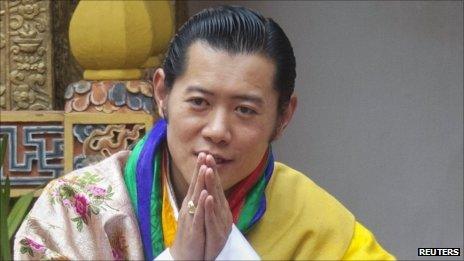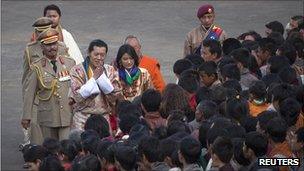Profile: Jigme Khesar Namgyel Wangchuck
- Published

Jigme Khesar is the fifth in a line of hereditary rulers who have reigned in Bhutan for the last 100 years.
Jigme Khesar Namgyel Wangchuck, 31, is one of the youngest monarchs in the world.
But despite his relative youth, the Bhutanese king was not thrown in at the deep end when he came to the throne in November 2008.
His father Jigme Singye Wangchuck - who himself acceded to the throne when aged only 16 - took great pains to ensure that his son was prepared to take over before his abdication in December 2006.
The young king had a difficult act to follow. His father won international acclaim for his role in turning Bhutan into a constitutional monarchy while his emphasis on gross national happiness - the idea that spiritual and mental well-being are more important than material prosperity - made him the darling of development groups the world over.
As crown prince Jigme Khesar was educated in India and the US before attending Oxford University to read politics and international relations.
After graduating, the future monarch was encouraged by his father to travel abroad and represent his country of 700,000 people.
King Jigme Khesar is the fifth in a line of hereditary rulers who have reigned in Bhutan for the last 100 years.
Challenges
Monarchs in Bhutan have always been revered - unlike in neighbouring Nepal where the king was unceremoniously deposed in 2008.
The new king in Bhutan did not have to try too hard to win over his people.
That is because most people in the kingdom were and remain staunch royalists. Some openly wept when they heard news of his father's plans to curb the powers of the monarchy.
Emotions ran similarly high when King Jigme Khesar married a commoner in October 2011.
Prime Minister Jigmi Thinley described him then as "the ultimate anchor" of the country, while opposition leader Tshering Tobgay said that the wedding "ensured the continuity of the monarchy" and "strengthened" the country's democracy.
Prior to his marriage the king's boyish good looks not only created a stir among numerous female fans but also won rave reviews in his home country, where his "diplomacy, charm and diplomatic finesse" was praised extensively in the press.
He and his wife Jetsun Pema are reported to share a passion for art.
Jigme Khesar is the oldest son of Jigme Singye and his third wife, Ashi Tshering Yangdon.
He has a younger sister and brother as well as four half-sisters and three half-brothers by his father's other three wives - all of his father's wives are sisters.
Utterly loyal
The young king began his reign without being officially crowned but was nevertheless confronted by a series of challenges that would have taxed the wisest of monarchs.

The monarchy is adored across all of Bhutan
Prominent among them was overseeing the final stages of democratisation in his country before the elections of March 2008.
Like his father, the new king stressed that it was critically important that his country complete the process of becoming a constitutional monarchy despite the reluctance of many of his subjects to see any diminution of the monarch's powers.
He travelled extensively around the country encouraging people to take part in the vote - in which both main parties competed for power on similar manifestos, utterly loyal to their king.
"Even though in terms of governance we are now a democracy, there is no elected individual who will enjoy the kind of respect, trust, confidence and reverence our kings enjoy," the prime minister said in 2008.
Perhaps the most high-profile challenge for the government in recent years has been the plight of thousands of ethnic Nepalese, who used to live in Bhutan but who say they were forced to take refuge in camps in Nepal in the 1990s.
Their status is still in dispute even though many have with the help of international agencies emigrated to the US, Canada and Australia.
Since coming to the throne the new king has been careful to ensure that his government has not upset Bhutan's larger neighbour, India, which is known to be concerned about what it says is the presence of Assamese rebels in the south of the kingdom.
Jigme Khesar signed a new treaty of friendship with India in February 2007, replacing a 1949 treaty. Delhi retains a strong influence over Bhutan's foreign policy.
Above all, the new king has ensured that the Bhutanese monarchy does not suffer the same fate as the royal family in Nepal.
The forward thinking of his father in scaling back the monarchy - and the popularity which has been lavished on his son - make that prospect unlikely.